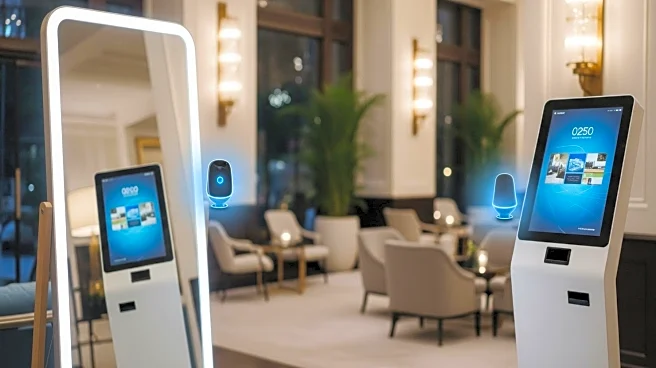What's Happening?
Hoteliers are increasingly leveraging artificial intelligence (AI) to improve guest experiences and boost revenue. The integration of AI tools such as ChatGPT and Gemini allows travelers to easily plan itineraries, which has led to a shift in traditional marketing strategies. AI-driven platforms like Sojern are being used to analyze traveler behavior and optimize marketing campaigns, enhancing efficiency and return on investment. These platforms manage thousands of campaigns daily, targeting millions of travelers by predicting booking likelihoods and adjusting strategies accordingly. The emphasis on user-generated content and personalized guest experiences is crucial for maintaining visibility in AI-influenced search results.
Why It's Important?
The adoption of AI in the hospitality industry signifies a major shift in how hotels engage with potential guests. By utilizing AI, hoteliers can offer personalized experiences that not only improve guest satisfaction but also enhance their property's visibility in search results. This is particularly important as AI tools prioritize user-generated content, such as guest reviews, in their algorithms. The ability to anticipate and meet guest needs through dynamic personalization and first-party data can lead to increased bookings and revenue. As AI continues to reshape the marketing funnel, hotels that focus on building authentic connections are likely to stand out and foster long-term loyalty.
What's Next?
As AI technology evolves, hoteliers are expected to further integrate these tools into their operations, enhancing guest interactions from the planning stage to post-stay feedback. The use of AI-enabled concierges and real-time monitoring of guest reviews will become more prevalent, allowing hotels to address issues promptly and improve overall guest satisfaction. The focus will remain on creating personalized experiences that drive bookings and build lasting relationships with guests. Additionally, the development of AI-driven advertising platforms, such as Google's Gemini, may offer new opportunities for hotels to reach potential guests more effectively.
Beyond the Headlines
The integration of AI in hospitality raises questions about data privacy and the ethical use of guest information. As hotels collect and analyze vast amounts of data to personalize experiences, they must ensure compliance with privacy regulations and maintain transparency with guests. Furthermore, the reliance on AI could lead to reduced human interaction, potentially impacting the traditional hospitality experience. Hoteliers must balance the efficiency of AI with the personal touch that defines the industry, ensuring that technology enhances rather than replaces human connections.









